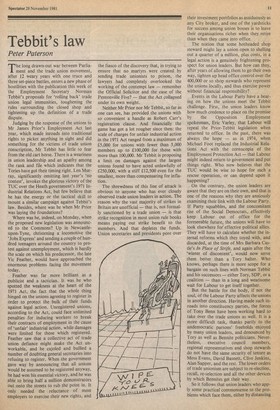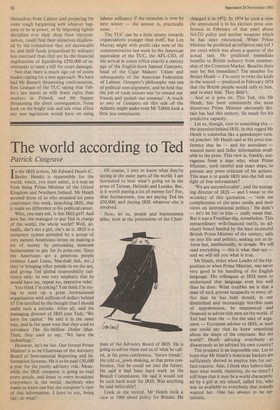Tebbit's law
Peter Paterson
The long drawn-out war between Parliament and the trade union movement, after 12 weary years with one truce and three set-piece battles, enters a new phase of hostilities with the publication this week of the Employment Secretary Norman Tebbit's proposals for 'rolling back' trade union legal immunities, toughening the rules surrounding the closed shop and tightening up the definition of a trade dispute.
Judging by the response of the unions to Mr James Prior's Employment Act last year, which made inroads into traditional rights to picket anything in sight and did something for the victims of trade union conscription, Mr Tebbit has little to fear from the old cart horse. There is a weariness in union leadership and an apathy among the rank and file which indicates that the Tories have got their timing right. Len Murray, significantly omitting last year's 'no contest', invokes the glorious victory of the TUC over the Heath government's 1971 Industrial Relations Act, but few believe that he has the energy or the tactical skill to mount a similar campaign against Tebbit's law. Besides, where was he when Mr Prior was laying the foundations?
Where was he, indeed, on Monday, when the proposed new legislation was announced to the Commons? Up in Newcastleupon-Tyne, christening a locomotive the 'Jobs Express' and sending a couple of hundred teenagers around the country to protest against unemployment, which is hardly the scale on which his predecessor, the late Vic Feather, would have approached the enormous problems facing the movement today.
Feather was far more brilliant as a publicist and a tactician. It was he who spotted the weakness at the heart of the 1971 Act, the fact that the whole thing hinged on the unions agreeing to register in order to protect the bulk of their funds against legal action. Unregistered unions, according to the Act, could face unlimited penalties for inducing workers to break their contracts of employment in the cause of 'unfair' industrial action, while damages were limited for those which registered. Feather saw that a collective act of trade union defiance might make the Act unworkable, and he cajoled and bullied a number of doubting general secretaries into refusing to register. When the government gave way by announcing that all unions would be assumed to be registered anyway, he had won his essential victory, and he was able to bring half a million demonstrators out onto the streets to rub the point in. It only needed the reluctance of most employers to exercise their new rights, and the fiasco of the discovery that, in trying to ensure that no martyrs were created by sending trade unionists to prison, the lawyers had completely overlooked the working of the contempt law — remember the Official Solicitor and the case of the Pentonville Five? — that the Act collapsed under its own weight.
Neither Mr Prior nor Mr Tebbit, so far as one can see, has provided the unions with so convenient a handle as Robert Carr's registration clause. And financially the game has got a lot rougher since then: the scale of charges for unfair industrial action in the 1971 Act ranged from a maximum of £5,000 for unions with fewer than 5,000 members up to £100,000 for those with more than 100,000. Mr Tebbit is proposing a limit on damages against the largest unions found to have acted unlawfully of £250,000, with a stiff £12,500 even for the smallest, more than compensating for inflation.
The shrewdness of this line of attack is obvious to anyone who has ever closely observed trade union leaders in action. The reason why the vast majority of strikes in Britain are unofficial — that is, not formally sanctioned by a trade union — is that strike recognition in most union rule books means paying out strike benefit to the members. And that depletes the funds. Union secretaries and presidents pore over their investment portfolios as assiduously as any City broker, and one of the yardsticks for success among union bosses is to leave their organisations richer when they retire than when they came into office.
The notion that some hotheaded shop steward might lay a union open to shelling out a quarter of a million, plus costs, in a legal action is a genuinely frightening prospect for union leaders. But how can they, after years of allowing them to go their own way, tighten up head office control over the 400,000 or so shop stewards who represent the unions locally, and thus exercise power without financial responsibility?
Events in the Labour Party have a bearing on how the unions meet the Tebbit challenge. First, the union leaders know how much credence to place on the promise by the Opposition Employment spokesman, Eric Varley, that Labour will repeal the Prior-Tebbit legislation when returned to office. In the past, there was always the hope — as in 1974, when Michael Foot replaced the Industrial Relations Act with the cornucopia of the Employment Protection Act — that Labour might indeed return to government and put things right. Who now believes that the TUC would be wise to hope for such a rescue operation, or can depend upon it happening?
On the contrary, the union leaders are aware that they are on their own, and that is one of the reasons why they are anxiously examining their link with the Labour Party. If Party squabbles, and the concomitant rise of the Social Democrats, effectively keep Labour out of office for the foreseeable future, the unions will have to look elsewhere fort effective political allies. They will have to calculate whether the internal reforms which they toyed with, and discarded, at the time of Mrs Barbara Castle's In Place of Strife, and again after the 'winter of discontent', would now serve them better than a Tory halter. Who knows, perhaps there is more scope for a bargain on such lines with Norman Tebbit and his successors — either Tory, SDP, or a coalition — than in a long and wearisome wait for Labour to get itself together.
But the battle for the body, if not the soul, of the Labour Party affects the unions in another direction. Having made such inroads into constituency parties, the forces of Tony Benn have been working hard to take over the trade unions as well. It is a more difficult task, thanks partly to the undemocratic parsons' freeholds enjoyed by many union leaders, and denounced by Tory as well as Bennite politicians. Nevertheless, executive council members, regional representatives and shop stewards do not have the same security of tenure as Moss Evans, David Basnett, Clive Jenkins, Alan Sapper, and the rest. The lower orders of trade unionism are subject to re-election, recall, re-selection and all the other devices by which Bennites get their way.
So it follows that union leaders who apply some practical commonsense to the problems which face them, either by distancing themselves from Labour and preparing for some tough bargaining with whoever happens to be in power, or by imposing tighter discipline over their shop floor representatives, could find their initiatives disallowed by the committees they are answerable to, and their funds jeopardised by militants less exercised than they are by the financial implications of liquidating £250,000 of investments to meet a bill for court damages.
Not that there is much sign yet of union leaders opting for a new approach. We have had Mr Basnett threatening confrontation, Ken Graham of the TUC saying that Tebbit's law leaves us with fewer rights than workers in Poland, and Mr Sapper threatening the direst consequences. None look on the bright side and ask what effect any new legislation would have on rising labour militancy if the recession is over by next winter — the answer is, practically none.
The TUC can be a little snooty towards organisations younger than itself, but Len Murray might with profit take note of the commemoration last week by the American equivalent of the TUC, the AFL-CIO, of the arrival in union office exactly a century ago of the English-born Samuel Gompers, head of the Cigar Makers' Union and subsequently of the American Federation of Labour. Gompers's philosophy was one of political non-alignment, and he held that the job of trade unions was 'to reward our friends and punish our enemies'. A touch or two of C;ompers on this side of the Atlantic might make even Mr Tebbit look a little less complacent.















































 Previous page
Previous page